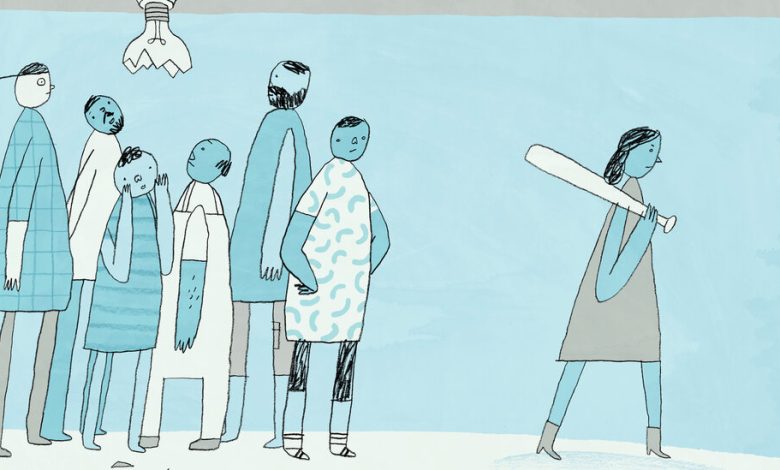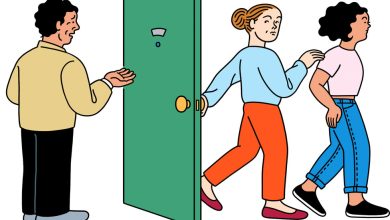The Slap That Changed Everything

A few months ago, a man on the street catcalled me and then spanked my left butt cheek. Although I was wearing a thick winter coat and the slap did not leave a mark, my skin was pulsating from it. I felt dirty. And while I did not see his hand or even look directly at his face, I could not stop visualizing the grime caked beneath his fingernails.
For years, I have trained myself to dissociate from situations like these, to laugh them off or to compartmentalize them into something that’s outside of my life. It was especially important for me to let these men (or any men) know that they couldn’t truly hurt me.
A physical assault from a catcaller wasn’t the standard fare, but like many women, I have been routinely harassed simply for looking the way I look, my boundaries violated both physically and sexually. It started early, when I was only 15, and a group of teenage boys at high school tackled me in front of the bus stop, a rush of animal aggression that I didn’t understand. Maybe they didn’t either.
Later I learned that they had a nickname for me: “Steinwhore.”
During my first job at a Tex-Mex restaurant at age 18, I was the only hostess asked to dress skimpily, awkwardly entertaining tequila-drunk men three times my age. Years later, it became a running joke among my friends that I was a fluorescent light attracting swarms of male moths. Whatever the reason for my ability to attract these somewhat dimwitted advances — whether it was the way I looked, or more than that — I’ll never know. It began to feel like an inevitability.
Now, at 30, I know what you can say and do to try to uphold boundaries with men. When I was younger, I didn’t. At 17, flying home from Rome, I let a young Italian man in his early 20s massage my back. When he went to the bathroom, a middle-aged American woman nearby said to me: “You just met — how could you let him touch you like that?”
As I entered my mid-20s, I would harden and snap back into a sort of survival-driven anger, feeling the impulse to take revenge or fight back. I once went through the intake process with an employment lawyer to take legal action against a former colleague, having woken up in his bed after too many drinks at an office party, not remembering exactly how I had gotten there.
I told the lawyer the whole story in a fluorescently lit room, meticulously constructing a timeline of my relationship with him and the incident. But this did not feel like justice or healing, and I abandoned the effort.
I held anger in my body, lashing out, staying stuck in a place of quiet, cold rage, but I did not want to become calcified or hardened. It felt unfair that I would have to become so calloused. What I wanted most was to move freely and happily through the world without feeling that I was in danger.
And selfishly, I did not want to pour my life’s precious time and resources into hating other people or holding them accountable for their acts. Moving ahead, if boundaries were violated, I would rather let them think they had me, without ever really having me, as punishment for their overreach.
Dissociation became essential protection from objectification, a way of leaving behind my baggage to feel lighter. Remaining carefree or unfeeling was an act of patriarchal defiance, even if it meant that along the way I lost some men who actually loved me.
Over time, I became very fluid with my sexual and romantic boundaries and had a difficult time remaining monogamous. I did turn down a lot of overtures, but I passively accepted many others. Whether I was flirted with, harassed, touched, demeaned, stalked or yes, even drugged and hit, I tried to laugh about it or embrace it, determined not to let anyone, any man or person with judgment, chip away at my joy or freedom. The more I could dissociate and detach, the more I felt I had the control to propel myself forward, vacillating between freezing and fleeing.
Several men have told me that I behaved “like a man” in my dating and romantic habits, because, according to them, I was able to have sex or date and move on without any sense of attachment, going from man to man. The truth is that I have always felt quite vulnerable, but I didn’t know how to survive an adventurous, curious or open life involving relationships with men without some level of dissociation.
Even if I did emulate what many would consider to be more of a man’s dating or sex pattern, I knew this was not the same as being a man. We are raised too differently and don’t share the same vulnerability. Men are not taught to feel shame in the same way as women. They are not typically called whores. By and large, they don’t have to worry about being butt-slapped in the street while wearing winter coats. They are not as afraid of getting killed on some random date.
Having experienced this shame and fear, I learned in certain moments to split from myself — to tell myself that this was happening to someone who is not me.
When I was spanked on the street that day, a few people saw it happen. “Oh my god, are you OK?” one asked. Instead of asking, “How could you let him do this?” another person said, “Are you all right?”
At that moment, I realized that I was not all right. And I broke down in front of this street of strangers, overtaken by a flood of tears.
I have hated the idea of defining myself as a victim, maybe because this also required acknowledging a perpetrator. I did not want to view the human world as so cruel, so inherently animal. While I would carry with me the knowledge of what some men were capable of doing to my body in a more boundary-less existence, I could not stare straight into that void, nor did I want to be mired in hate for these dozens of perpetrators.
But here I was, faced with the reality that this man on the street could not be defined as anything other than a perpetrator. The empathetic witnesses to the situation made it impossible for me to move on, to leave it hidden away in a private place with a locked door.
At first, my deepest fears floated around me: You brought this upon yourself. Your very existence is an incitement of chaos and disorder. Like the fluorescent light attracting the moths, it was natural, the purpose of my being.
But I did not want to be a fluorescent light, the clinical light of an examination room, devoid of feeling. I wanted to be a warm, incandescent glow — like a lightning bug, or maybe an inviting fireplace. I did not want to stay frozen. I wanted to thaw.
Because this assault had taken place in full public view, I found it impossible to rationalize why he had struck me, and I found it impossible to push away. I had not agreed to be touched by this man, ever. I did not know his name, nor did he know mine.
The only words he said to me were: “How much do you cost?”
And so I filed a police report about it, and the New York Police Department’s special victims unit found camera footage of the spank, which made it even more real. This was not a thing to laugh off or compartmentalize. It was a crime.
When I told my therapist about the incident, she texted, “Some men can be appalling, and you have seen too much of it.”
I suppose what disturbs me the most about what happened on the street that day is that for the first time in my life, I recalled the countless earlier incidents that had happened to me over the years, starting when I was only 15, and suddenly I saw all of those men differently. I struggled to differentiate this spanker from the others who I had let do what they wished to me.
After that realization came another, more important one: I am a person deserving of protection. I can become my own bystander, a kinder and less judgmental version of that middle-aged woman on the plane. Boundaries make me safe, and I am a person deserving of safety.
Freedom and free-spiritedness should not have to come at the cost of being a repository for the carnal impulses of men. Men don’t have to have my body, but I have to have my body. And I can still be light.
Ariella Steinhorn, who lives in New York City, is a founder of Lioness, a story publishing platform.
Modern Love can be reached at [email protected].
To find previous Modern Love essays, Tiny Love Stories and podcast episodes, visit our archive.
Want more from Modern Love? Watch the TV series; sign up for the newsletter; or listen to the podcast on iTunes, Spotify or Google Play. We also have swag at the NYT Store and two books, “Modern Love: True Stories of Love, Loss, and Redemption” and “Tiny Love Stories: True Tales of Love in 100 Words or Less.”





